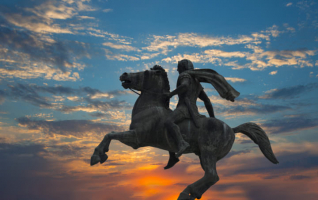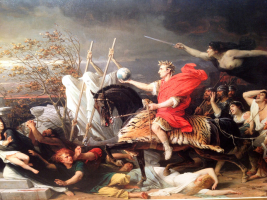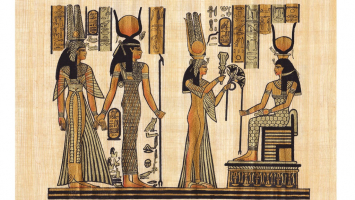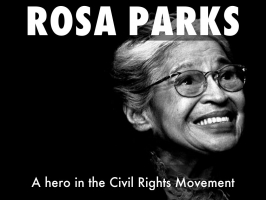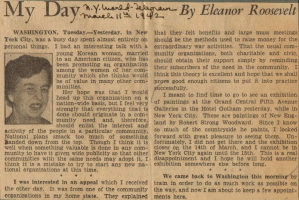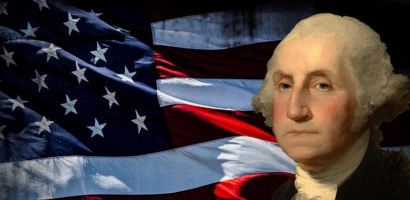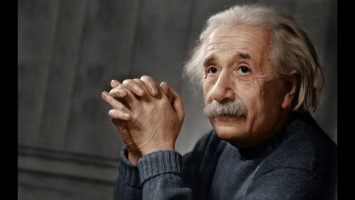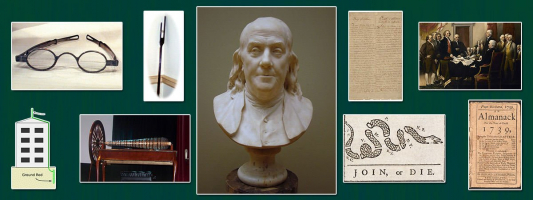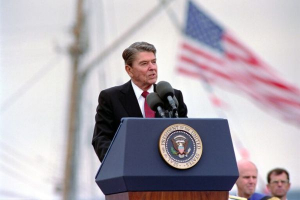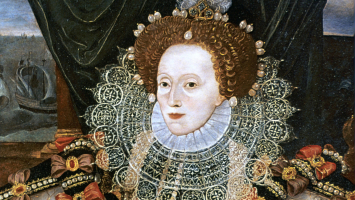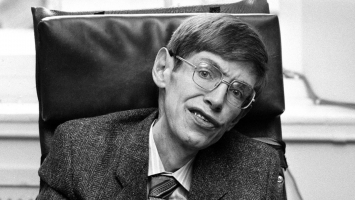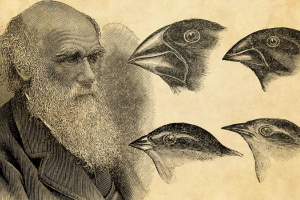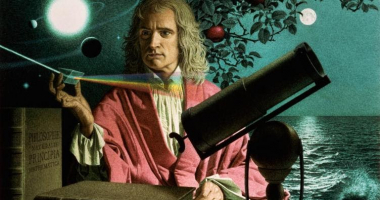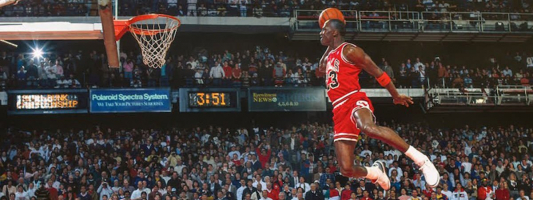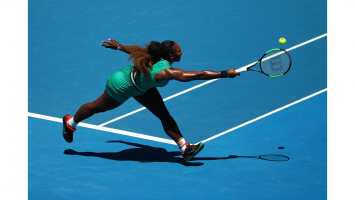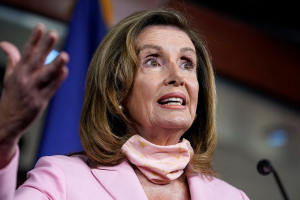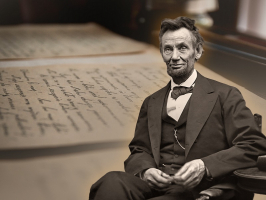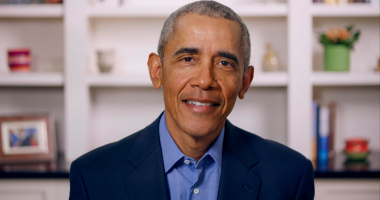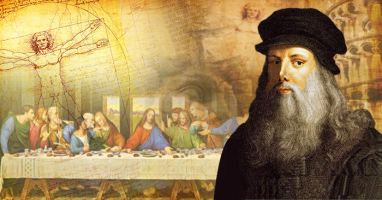Top 10 Major Accomplishments of Muhammad Ali
Muhammad Ali (January 17, 1942 - June 3, 2016) was a professional boxer and activist from the United States. He is widely recognized as one of the most ... read more...important and celebrated sports figures of the twentieth century and is regularly listed as the greatest heavyweight boxer of all time. Here are the 10 major accomplishments of Muhammad Ali.
-
One of the major accomplishments of Muhammad Ali is that he won the light heavyweight gold medal in the 1960 Summer Olympics in Rome. Ali was originally introduced to boxing by a Louisville police officer and boxing teacher Joe E. Martin, who came upon the 12-year-old ranting over a robber who had stolen his bicycle. He informed the officer that he planned to "whup" the robber. Clay was advised by the officer to first learn how to box. Clay first declined Martin's offer, but after seeing amateur boxers on a local television boxing show called Tomorrow's Champions, Clay became interested in the thought of fighting. He subsequently began working with trainer Fred Stoner, whom he credits with providing him with serious training, eventually shaping "my style, stamina, and system." Clay was instructed by boxing cutman Chuck Bodak for the final four years of his amateur career.
Clay made his amateur boxing debut in 1954 against Ronnie O'Keefe, a local amateur boxer. He won on a tie vote. He went on to win six Kentucky Golden Gloves championships, two national Golden Gloves championships, an Amateur Athletic Union national championship, and the light heavyweight gold medal in the 1960 Summer Olympics in Rome. Clay won his first three Olympic fights, two fights by unanimous decision and one fight by second-round knockout. He faced three-time European champion, Zbigniew Pietrzykowski of Poland, in the final. Clay reached the top form in the third round, mauling his opponent and nearly achieving a knockout after being dominated by his opponent in the opening two rounds. Clay was declared the winner by all judges, making him the Olympic light heavyweight champion.
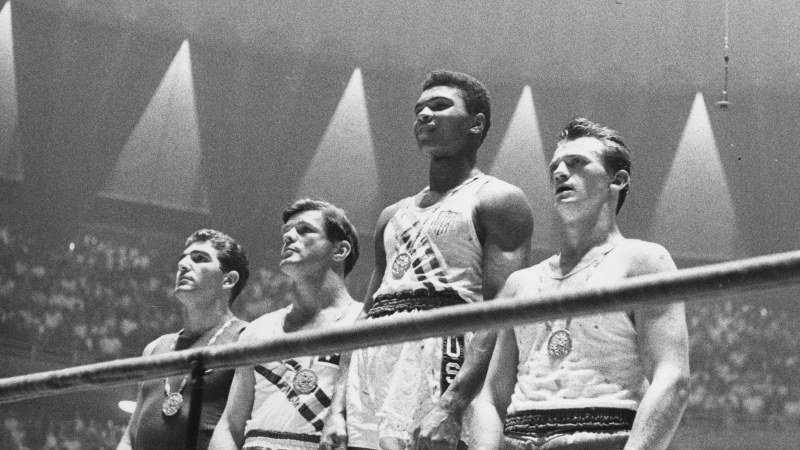
olympics.com 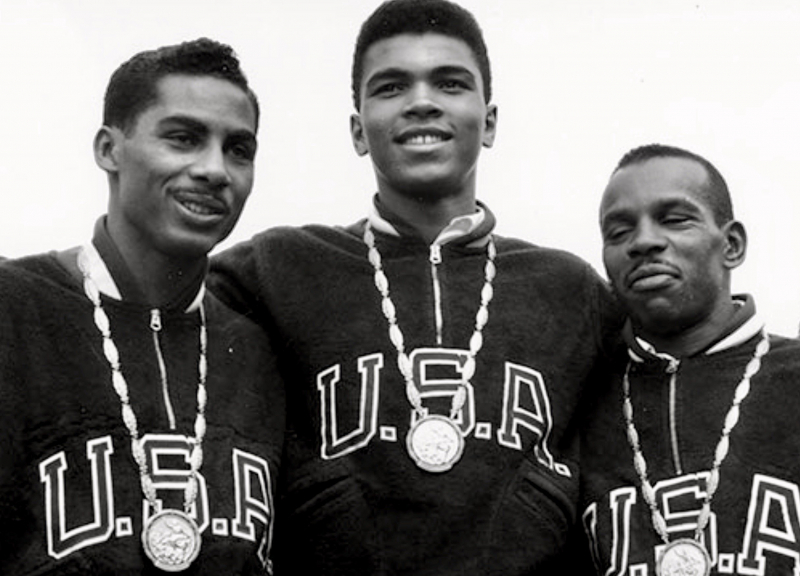
twitter.com -
By late 1963, Clay (his birth name) had established himself as the leading contender for Sonny Liston's belt. The battle was scheduled to take place on February 25, 1964, in Miami Beach. Liston had an intimidating attitude and was a dominant fighter with a criminal background and ties to the mob. Clay was a 7–1 underdog based on his uninspiring performance against Jones and Cooper in his previous two fights, and Liston's annihilation of former heavyweight champion Floyd Patterson in two first-round knockouts.
The fight resulted in a stunning upset. At the start of the fight, Liston charged at Clay, seemingly angry and looking for a quick knockout. Clay's better speed and agility, on the other hand, allowed him to avoid Liston, causing the champion to miss and appear awkward. At the close of the first round, Clay opened up his offensive and repeatedly jabbed Liston. Liston fought better in round two, but Clay caught him with a combination that collapsed his knees and created a cut beneath his left eye in the third round. This was the first time Liston had ever been cut. Clay was returning to his corner at the end of round four when he began to experience blinding pain in his eyes and requested his trainer, Angelo Dundee, to cut off his gloves.
Despite Liston's attempts to knock out a blinded Clay, Clay managed to make it through the fifth round until perspiration and tears washed the irritation from his eyes. Clay dominated the sixth, regularly striking Liston. Liston did not respond to the seventh-round bell, and Clay was proclaimed the winner by TKO. He became the youngest boxer to take the title from a reigning heavyweight champion at the age of 22.
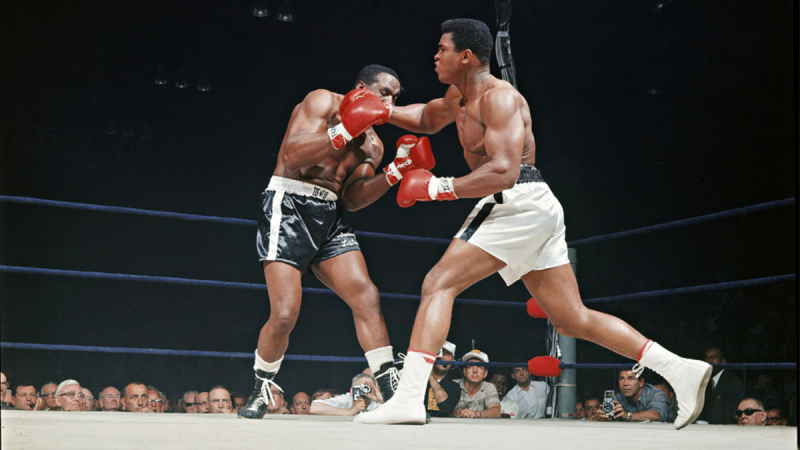
si.com 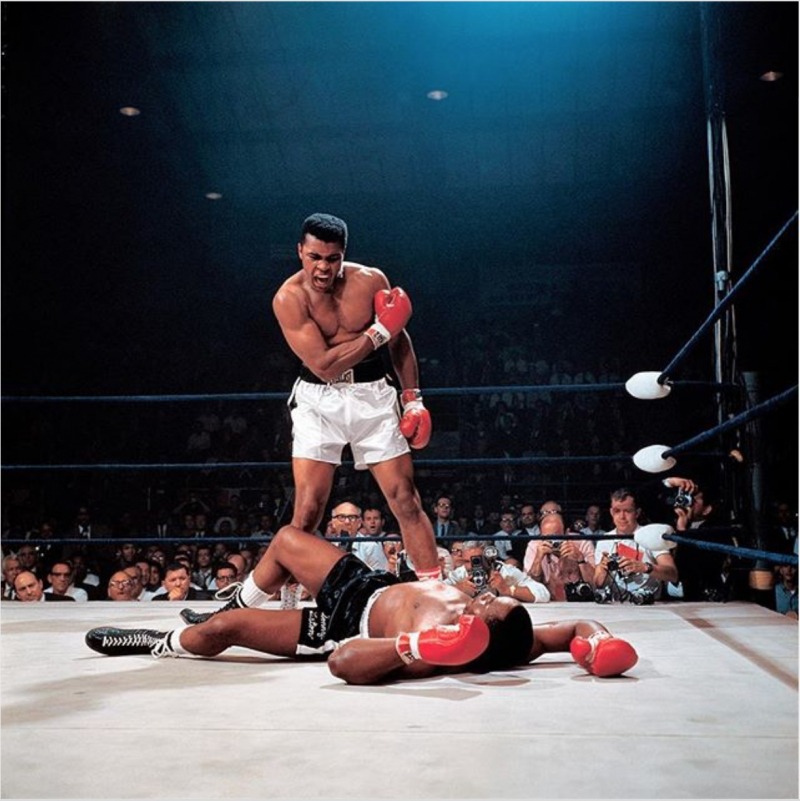
aboutphotography.blog -
One of the major accomplishments of Muhammad Ali is that he had the fight of the Century against Joe Frazier. Due to the immense hype around a meeting between two undefeated fighters, both with a legitimate claim to be heavyweight champion, Ali and Frazier's first fight, held at the Garden on March 8, 1971, was dubbed the "Fight of the Century." John Condon, a veteran US boxing reporter, declared it "the greatest event I've ever worked on in my life." The fight was broadcast in 36 countries, and the promoters provided 760 press passes.
The extensive pre-fight theatrics and name-calling added to the atmosphere. Before the fight, Frazier referred to Ali as "Cassius Clay," which infuriated Ali and then Ali described Frazier as a "dumb tool of the white establishment." "Frazier is too ugly to win," Ali added. "Frazier is too dumb to be champ." Ali also commonly called Frazier an "Uncle Tom." According to Dave Wolf, who worked in Frazier's camp, he recalled that "Ali was saying 'the only people rooting for Joe Frazier are white people in suits, Alabama sheriffs, and members of the Ku Klux Klan. I'm fighting for the little man in the ghetto.' Joe was sitting there, smashing his fist into the palm of his hand, saying, 'What the fuck does he know about the ghetto?".
The battle on Monday night lived up to its expectations. A crouched, bobbing, and weaving Frazier aggressively harassed Ali, getting struck routinely by Ali jabs and combinations but relentlessly attacking and scoring repeatedly, particularly to Ali's torso. The battle was close in the early rounds, but Ali was taking more punishment than he had ever taken in his career. In the later rounds, Ali leaned on the ropes and accepted damage from Frazier, intending to tire him out. This was the first occurrence of the rope-a-dope strategy.
In the 11th round, Frazier wobbled Ali with a left hook, but because Ali appeared to be clowning as he staggered back across the ring, Frazier was hesitant to pursue his advantage, fearing an Ali counter-attack. Frazier knocked Ali down in the final round with a devastating left hook that referee Arthur Mercante described as hard as a guy can be hit. Ali was up and running again in three seconds. Despite this, Ali was defeated by unanimous decision, his first professional defeat.
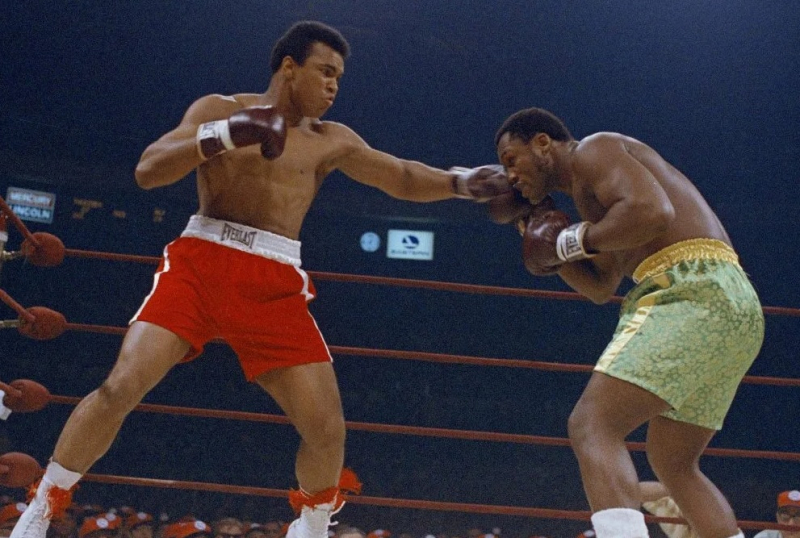
boxingjunkie.usatoday.com 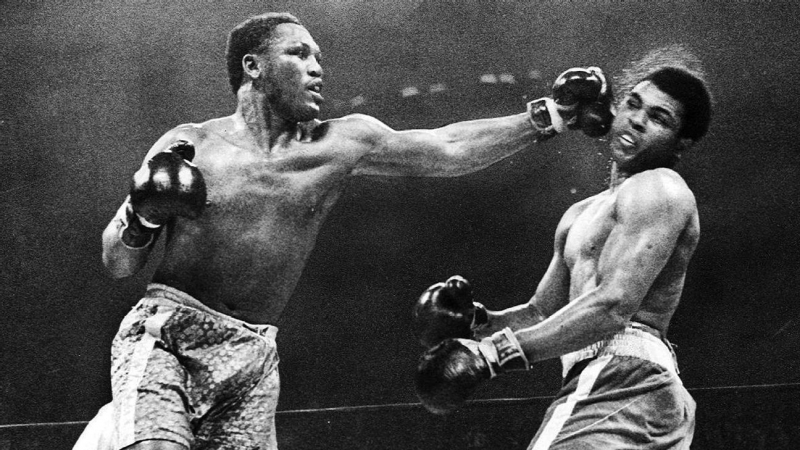
espn.com -
Ali won the Rumble in the Jungle against George Foreman. The defeat by Frazier set up a title battle versus heavyweight champion George Foreman on October 30, 1974, in Kinshasa, Zaire (a bout nicknamed The Rumble in the Jungle). Foreman was regarded as one of the most powerful punchers in heavyweight history. Analysts noted that Joe Frazier and Ken Norton, who had given Ali four tough fights and won two of them, had both been knocked out in the second round by Foreman. Ali was 32 years old, and his quickness and reflexes had noticeably deteriorated since his twenties. In contrast to his subsequent demeanor, Foreman had a brooding and menacing presence at the time.
Ali started the fight by moving and scoring on Foreman's head with right crosses. To the chagrin of his corner, Ali retreated to the ropes in the second round and urged Foreman to strike him while covering up, clinching, and counter-punching as well as loudly taunting Foreman. The move, subsequently known as the "Rope-a-dope," so defied conventional boxing wisdom, letting one of boxing's hardest hitters strike at will, that ringside reporter George Plimpton assumed the bout had to be fixed.
As his temper grew, Foreman fired punches that were deflected and did not hit properly. As Foreman began to tire, Ali countered more frequently and efficiently with punches and flurries, electrifying the pro-Ali crowd. Ali felled a tired Foreman with a combination at the middle ring in the eighth round. Ali had reclaimed the title by knockout against all odds and in the midst of chaos in the ring.
In 1977, President Jimmy Carter greets Ali at a White House dinner. Ali had into the fight as a 4-1 underdog against the previously unbeaten, heavy-hitting Foreman. Ali's introduction of the rope-a-dope method made the bout legendary. A record-breaking television audience of one billion viewers worldwide tuned in to witness the battle. It was the most-watched live television broadcast in history at the time.
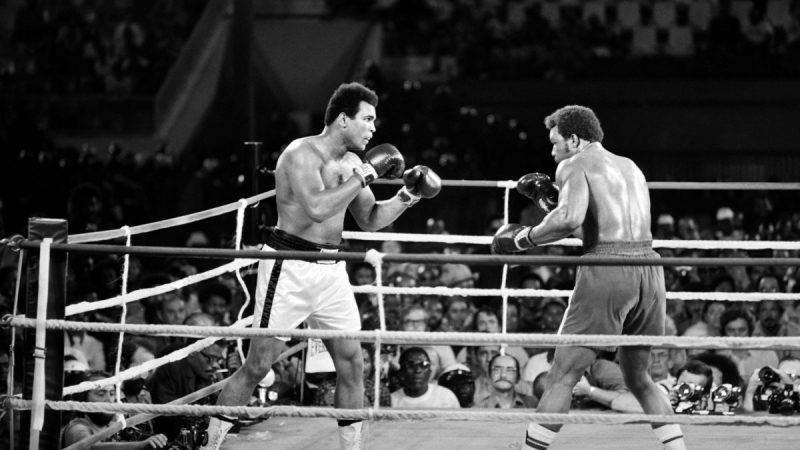
history.com 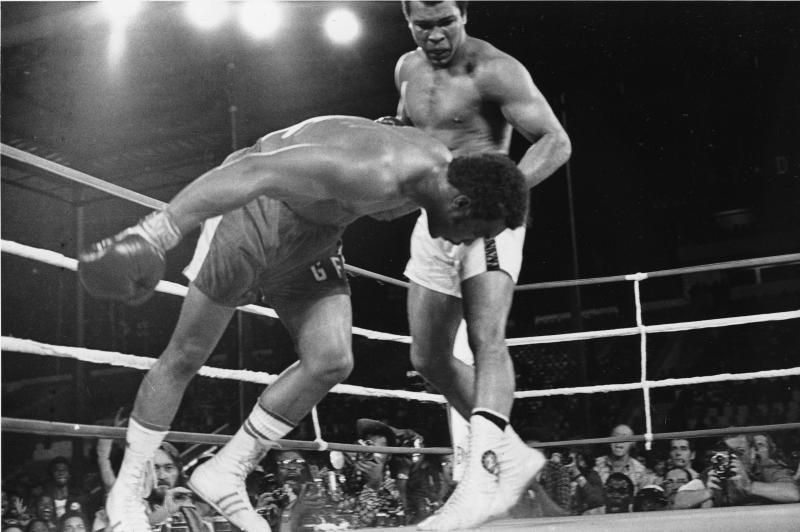
bleacherreport.com -
He won the Thrilla against Joe Frazier in Manila in 1975. The battle is widely regarded as one of the best and most vicious in boxing history, and it was the finale of a three-fight rivalry between the two boxers, which Ali won 2-1. The battle drew a record global television audience of an estimated 1 billion viewers, including 100 million people on closed-circuit theatre television and 500,000 pay-per-view purchases on HBO home cable television.
Ali was sharp from the outset, as Frazier couldn't bob and weave his way inside Ali's jab. The first two rounds were won by Ali. He maintained Frazier in the center of the ring and followed his left jab with several straight-right punches. Two strong punches in the early rounds wobbled or pushed Frazier off balance.
Ali also continued to attack his opponent verbally, most notably in the third round, when he was doing well and had lots of energy. During round 3, Ali began to employ the "rope-a-dope" tactic, in which he used the ropes for support and rest while his opponent expended energy throwing blows. When it worked, Ali would turn off the ropes and unleash a barrage of blows in fast succession on an arm-weary opponent. Ali launched a series of strong punches, many of which missed, about two minutes into the round.
Frazier's timing and rhythm of bobbing and weaving improved during the fifth round. Ali spent the majority of the round on the ropes. Indeed, Frazier landed a massive left hook that thudded on the right side of Ali's face immediately after the bell rung to begin the sixth round. Frazier then landed a huge, whipping left hook to Ali's head seconds later. Ali landed on the ropes behind him again, but this time he appeared slightly bewildered and stiff-legged. Despite this, Ali remained standing and finished the round without being knocked down.
Beginning in round 7, Ali was able to do so effectively for approximately a round and a half, and he was able to best Frazier in exhausting toe-to-toe exchanges during the first minute of round 8. Frazier began to weary in the 12th round, and Ali closed Frazier's left eye with powerful blows and caused a cut over his right eye. This impaired Frazier's vision, allowing Ali to dominate the 13th and 14th rounds. Eddie Futch, Frazier's trainer, conceded the fight before the 15th round. Ali was thus able to defend his title and win the final of his three fights against Frazier, winning 2-1.
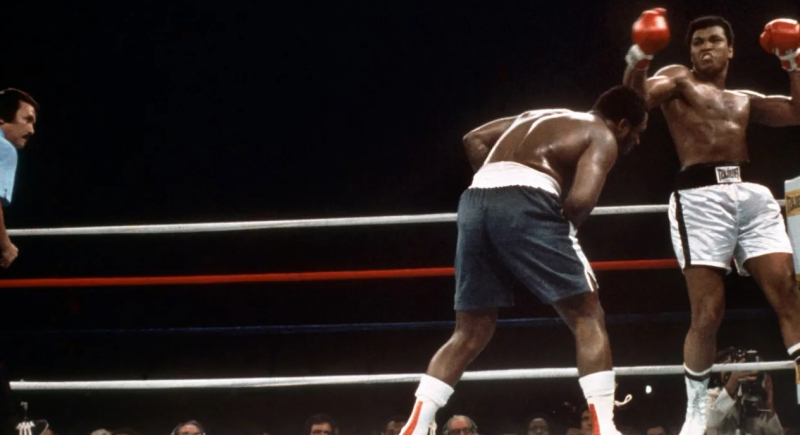
gq-magazine.co.uk 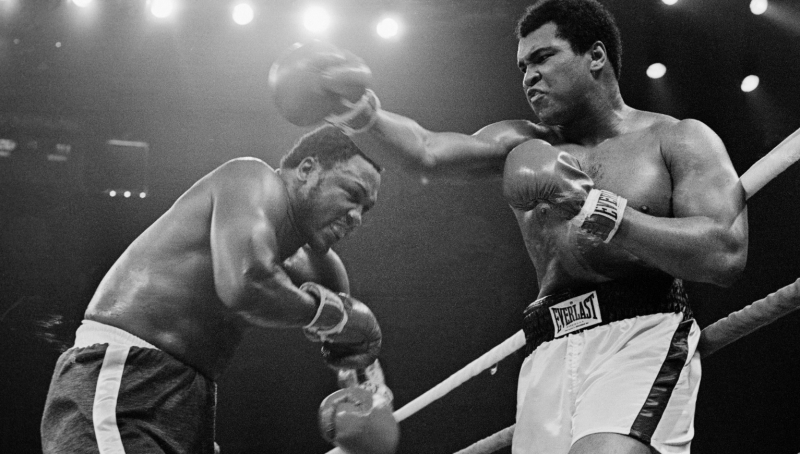
themanual.com -
Ali faced Leon Spinks at the Hilton Hotel in Las Vegas in February 1978. Spinks had only seven professional fights under his belt at the time and had previously fought a draw with journeyman Scott LeDoux. Ali had only sparred a few dozen rounds in preparation for the fight and was severely out of shape by the opening bell. He was defeated in a split decision.
The WBA and The Ring heavyweight championships were contested on September 15, 1978, in New Orleans by Leon Spinks and Muhammad Ali II. Following his surprising victory against Ali to become Heavyweight champion, Leon Spinks was stripped of the WBC title for failing to face the organization's number one ranked contender Ken Norton; instead, he consented to a rematch with Ali. Ali entered the rematch as a 2½ to 1 favorite. Ringside seats for the bout cost $200 ($839 in 2021 money) at the Louisiana Superdome. The card contained three other world title fights: WBA Bantamweight Champion Jorge Luján faced future WBC champion Alberto Davila, WBC Featherweight Champion Danny Lopez faced Juan Malvarez, and WBA Light Heavyweight Champion Victor Galindez faced Mike Rossman.
The event drew 70,000 spectators and a total of $6 million in admissions, making it the highest live gate in boxing history at the time. Ali won a unanimous decision in an uninspiring battle, with referee Lucien Joubert scoring rounds 10-4, judge Ernie Cojoe scoring rounds 10-4, and judge Herman Preis scoring rounds 11-4. Ali became the first heavyweight champion to hold the title three times.
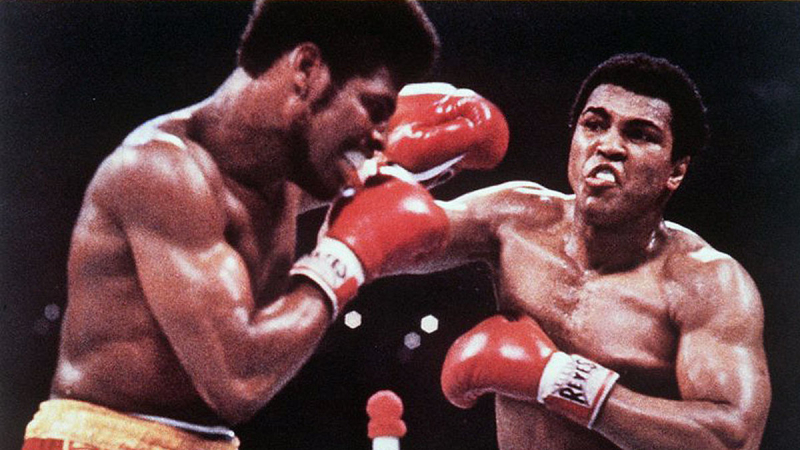
si.com 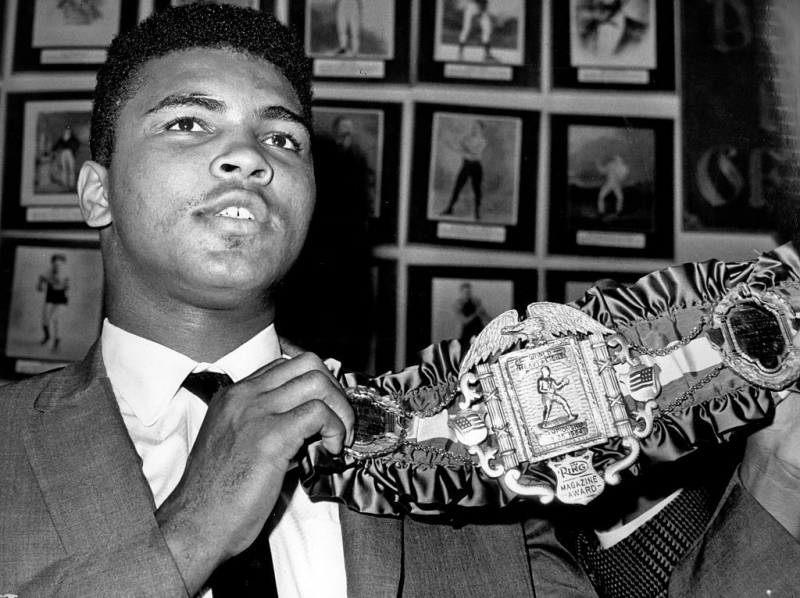
menshealth.com -
On his 18th birthday, Ali registered for military service in the United States and was assigned as 1-A in 1962. He was reclassified as Class 1-Y (suitable for service only in times of national emergency) in 1964 after failing the U.S. Armed Forces qualifying test due to his dyslexia-related writing and spelling skills. By early 1966, the army had lowered its criteria to allow soldiers above the 15th percentile to serve, and Ali was reclassified as 1-A. This classification made him eligible for the conscription and entry into the United States Army during a period when the United States was participating in the Vietnam War, a war that further estranged him from the white establishment.
When informed of his position, Ali decided that he would refuse to serve in the army and declared himself a conscientious objector publicly. In 1966, Ali enraged the white establishment by refusing to be recruited into the United States military, citing his religious convictions and opposition to American engagement in the Vietnam War.
Ali was unable to receive a boxing license in any state for the next three years. On June 20, 1967, after only 21 minutes of deliberation, the jury declared Ali guilty of breaching the Selective Service statutes by refusing to be drafted.
Despite the Appellate Court judgment and the Supreme Court decision, Ali was free. As public opinion began to turn against the war and the Civil Rights Movement gained traction, Ali became a popular speaker at colleges and institutions around the country. His refusal to join in the Vietnam War made him a symbol for many people. Many African Americans and others were impressed by Ali's example. However, when he declined induction, he became possibly the most despised man in the country, receiving several death threats. According to William Rhoden, a New York Times columnist, "Ali's actions changed my standard of what constituted an athlete's greatness. Possessing a killer jump shot or the ability to stop on a dime was no longer enough. What were you doing for the liberation of your people? What were you doing to help your country live up to the covenant of its founding principles?"
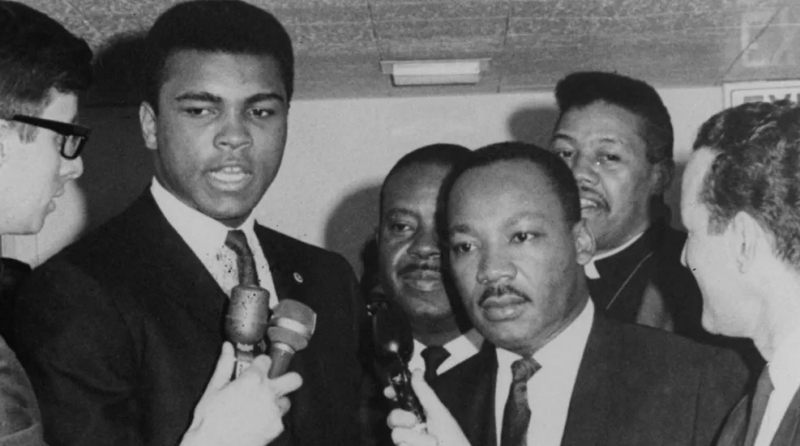
courier-journal.com 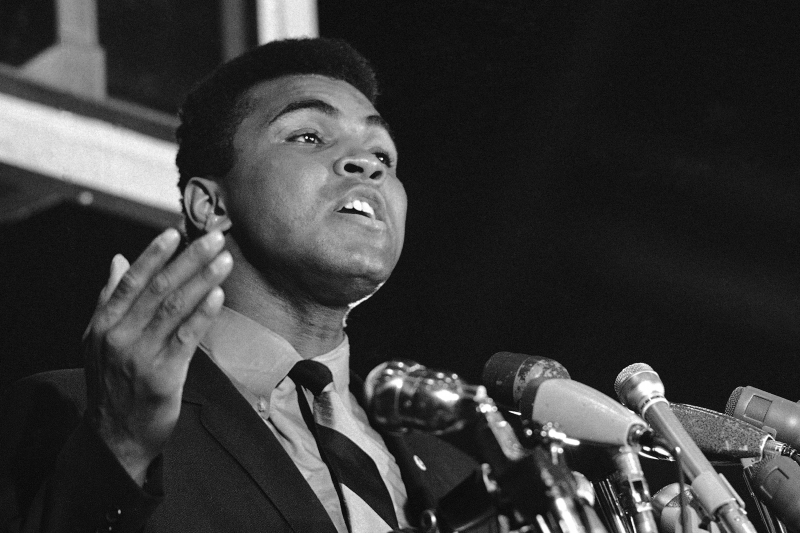
bleacherreport.com -
Ali was well-known as a humanitarian and philanthropist. He focused on fulfilling his Islamic obligation of charity and good acts, donating millions to charitable organizations and impoverished individuals of all faiths. It is believed that Ali helped feed more than 22 million hungry people around the world. One of his early work priorities was youth education. He spoke at various historically black colleges and institutions about the importance of education and became the United Negro College Fund's highest single black donor in 1967 with a $10,000 donation ($78,000 in 2020 USD).
Ali began touring Africa in 1964 when he went to Nigeria and Ghana. In 1974, he paid a visit to a Palestinian refugee camp in Southern Lebanon, declaring his "support for the Palestinian struggle to liberate their homeland." In 1978, after losing to Spinks and before winning the rematch, Ali visited Bangladesh and was granted honorary citizenship. The same year, he joined musician Stevie Wonder and actor Marlon Brando in The Longest Walk, a protest march in the United States in support of Native American rights.
In 1980, President Jimmy Carter appointed Ali to a diplomatic mission to Africa in order to encourage a number of African states to join the US-led boycott of the Moscow Olympics (in response to the Soviet Invasion of Afghanistan). Around 1987, the California Bicentennial Foundation for the United States Constitution chose Ali to represent the vitality of the United States Constitution and Bill of Rights. During the First Intifada, Ali took part in a pro-Palestine protest in Chicago in 1988. He visited Sudan the same year to raise awareness about the plight of famine victims. Prior to the Gulf War, Ali traveled to Iraq and met with Saddam Hussein in an attempt to negotiate the release of American hostages.
In 1994, Ali advocated for the United States government to come to the rescue of Rwandan genocide refugees and to donate to organizations that assist Rwandan refugees. Ali traveled to Afghanistan as the "United Nations Messenger of Peace" on November 17, 2002. He was in Kabul as a special UN guest for a three-day goodwill mission. He received the Philadelphia Liberty Medal in 2012 in recognition of his career engagement, charity, and humanitarianism.
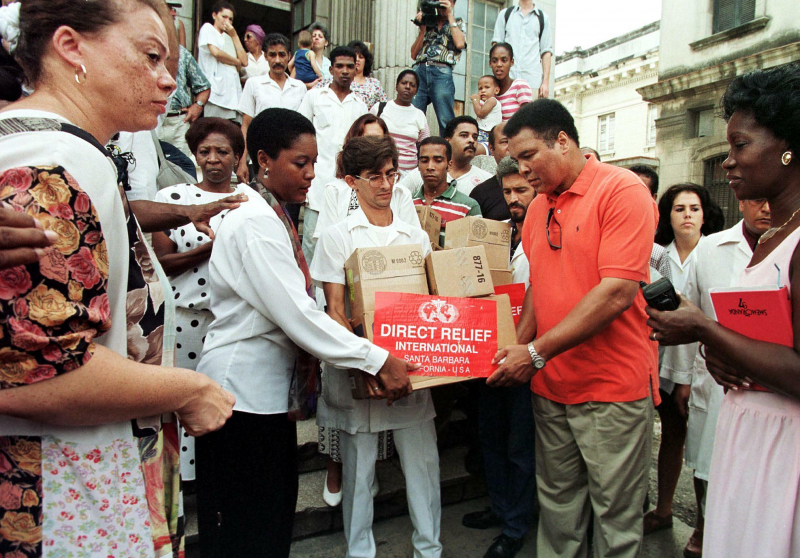
mashable.com 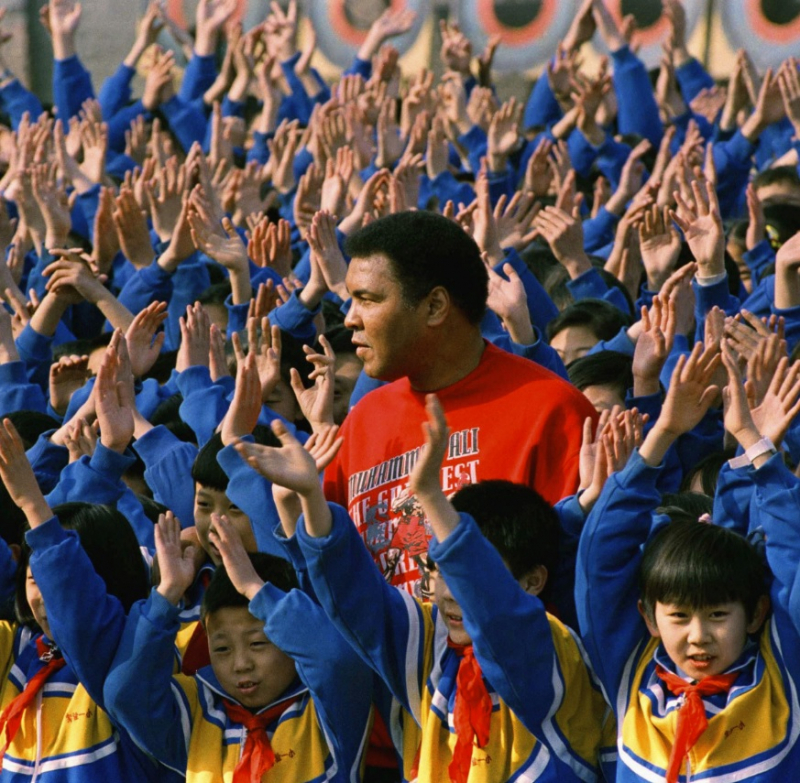
mashable.com -
One of the major accomplishments of Muhammad Ali is that he is honored as one of the greatest athletes of the twentieth century. Ali is the only three-time lineal heavyweight champion in history. He is the only boxer to have been chosen The Ring magazine's Fighter of the Year six times, and he has participated in more Ring "Fight of the Year" contests than any other fighter. Muhammad Ali was admitted into the International Boxing Hall of Fame in its first year and possessed victories over seven other Hall of Fame entrants during the so-called golden age of heavyweight boxing. According to the Associated Press, he was the second-best boxer and heavyweight of the twentieth century. For 35 years, his combined records of beating 21 boxers for the world heavyweight title and winning 14 title match stood.
In 1990, Life magazine named Ali one of the 100 most important Americans of the twentieth century. The Associated Press reported in 1993 that Ali was tied with Babe Ruth as the best-recognized athlete in America, out of nearly 800 dead or live athletes. According to the poll, more than 97 percent of Americans over the age of 12 recognized both Ali and Ruth. He received the Arthur Ashe Courage Award in 1997.
He was towards the top of most lists of the century's greatest athletes by the end of the twentieth century. Sports Illustrated named him Sportsman of the Century. He garnered more votes than the other five finalists combined to be named BBC Sports Personality of the Century. He was awarded USA Today's Athlete of the Century and ESPN Sports Century's third greatest athlete of the twentieth century. In festivities at the Galt House East, Ali was honored "Kentucky Athlete of the Century" by the Kentucky Athletic Hall of Fame.
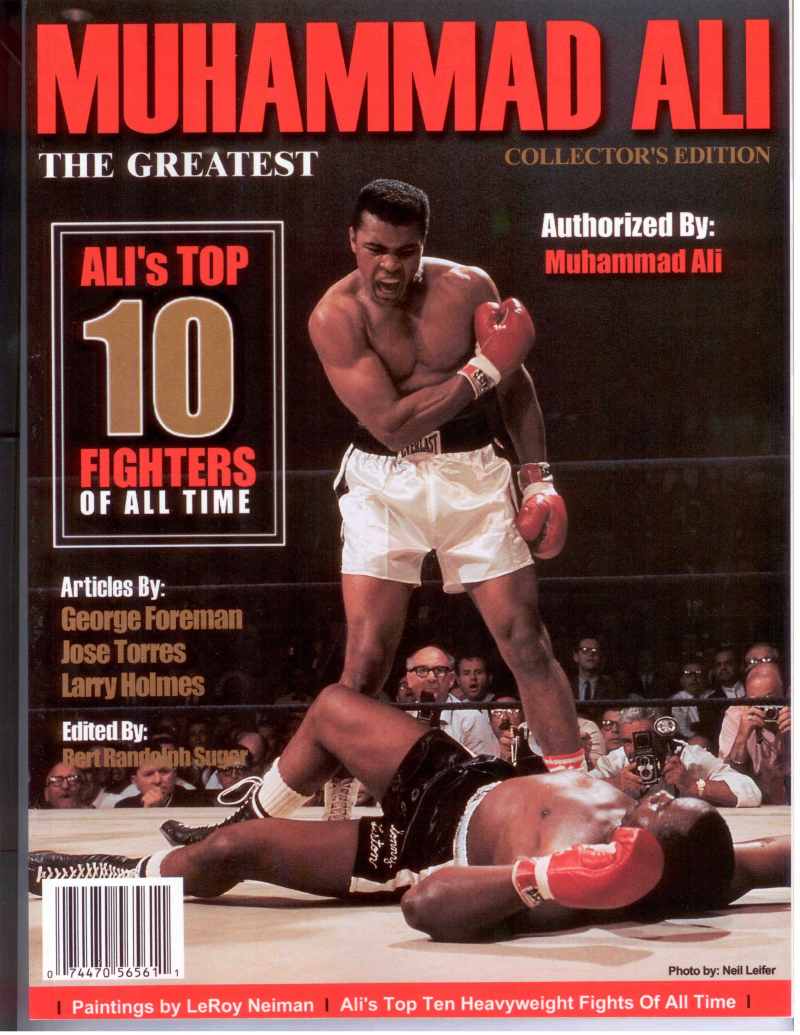
pinterest.com 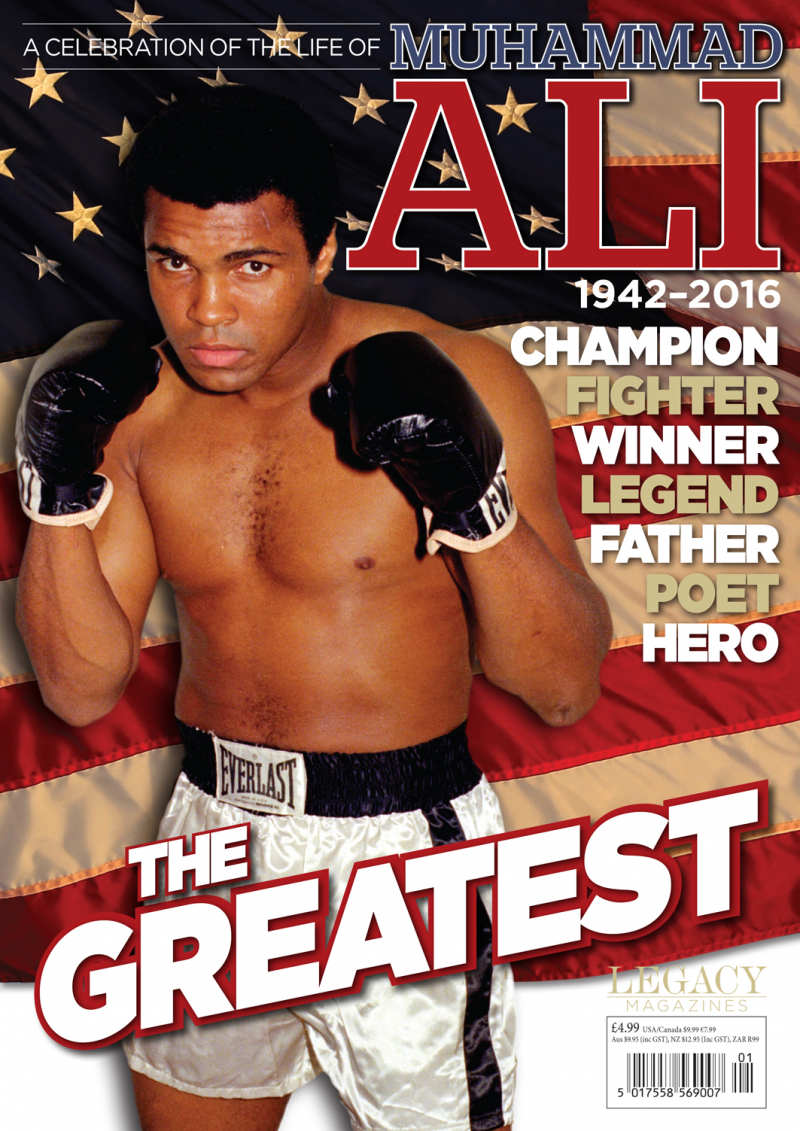
royallifemagazine.co.uk -
The Presidential Medal of Freedom is an honor given by the President of the United States to those who have made an extraordinarily outstanding contribution to the security or national interests of the United States, international peace, cultural or other major public or private efforts. The Presidential Medal of Freedom and the Congressional Gold Medal is the United States' highest civilian honors. The medal is not limited to citizens of the United States, and while it is a civilian award, it can also be given to military troops and worn on their uniforms. President John F. Kennedy introduced it in 1963, succeeding President Harry S. Truman's Medal of Freedom, which was established in 1945 to commemorate civilian service during World War II. There are no specified criteria for getting the award with distinction; Executive Order 11085 only states that the honor should come in two degrees, and so the choice to give the higher degree is entirely at the president's discretion.
The Presidential Medal of Freedom is the highest civilian decoration in the United States, whereas the Medal of Freedom was inferior in precedence to the Medal for Merit; the Medal of Freedom was awarded by any of three Cabinet secretaries, whereas the Medal for Merit, like the Presidential Medal of Freedom, was awarded by the president.
President Bill Clinton honored Muhammad Ali with the Presidential Citizens Medal on January 8, 2001. In November 2005, Muhammad Ali was awarded the Presidential Medal of Freedom from President George W. Bush, and on December 17, 2005, he received the Otto Hahn Peace Medal in Gold from the UN Association of Germany (DGVN) in Berlin for his work with the civil rights movement and the United Nations.
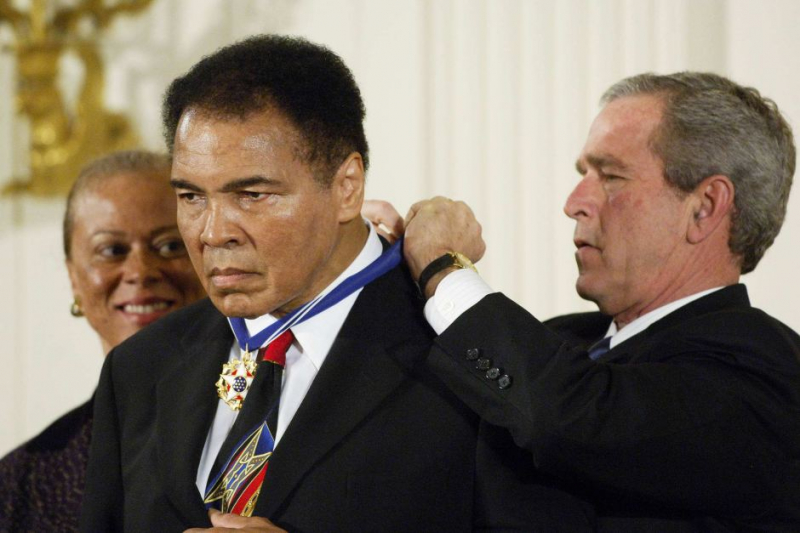
abc.net.au 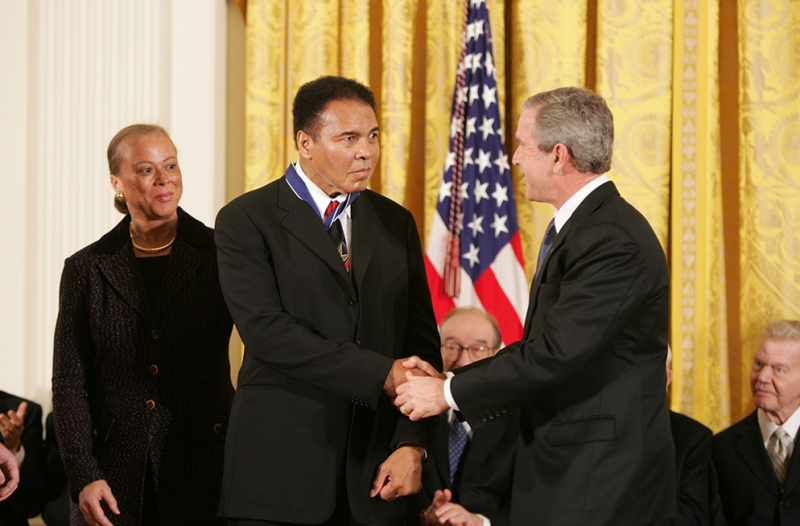
commons.wikimedia.org












